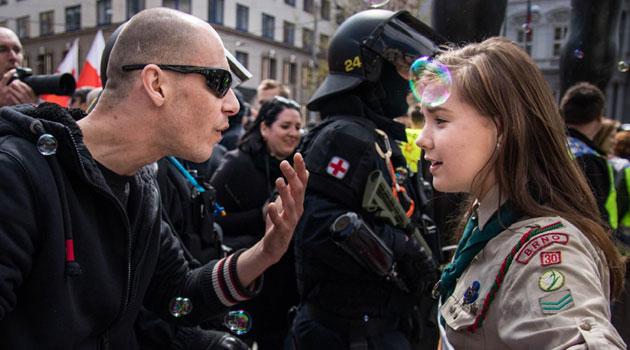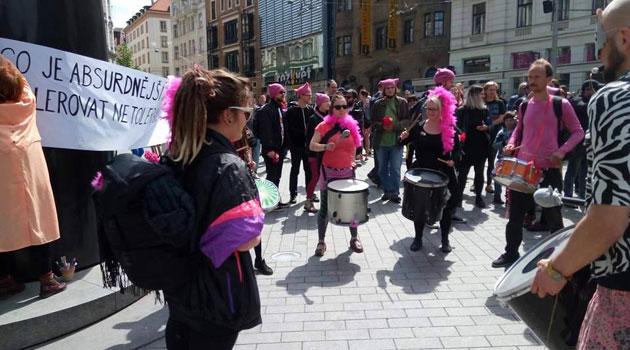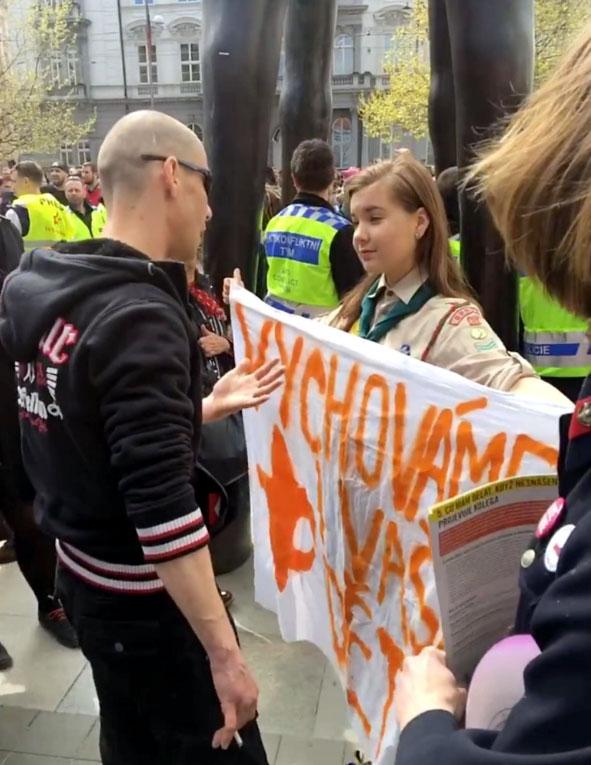Girl Scout from iconic photo in Brno, Czech Republic tells Romea.cz she feels obligated to protest fascist ideologies and opinions

An iconic photograph of a young Girl Scout who decided to protest on 1 May 2017 against a neo-Nazi assembly in Brno, Czech Republic has flown around the Internet, and not just the “Czech” one. The photo has received more than 60 000 “likes” and almost 6 000 comments on the Reddit social networking site.
The photo has been disseminated just as rapidly through the Facebook social networking site, was posted to Twitter by the global scouting organization, and has been published by media abroad such as CNN, The New York Times, The Huffington Post
and International Business Times. It has already been catalogued as an historic protest photograph like the one in which a woman in Sweden used her purse to attack marching neo-Nazis, the photograph of Ieshia Evans during protests against police brutality on 9 July 2016 in Louisiana, USA, or the photograph of Saffiyah Khan smiling at a raging racist from the English Defence League during a march this year in Birmingham, England.
Who is the young heroine in this latest photograph? She is 16 years old and studying animation and film in Brno.
“I’m interested in the arts and culture. I lead children in scouting. I ride a bike and do my best to be active in as many directions as possible,” Lucie “Lála” Myslíková told news server Romea.cz.
“I was not afraid there – if anyhing had happened to me, I would have gotten over it, but if I had decided to stay quiet, I would never have recovered from that.”
Q: Why did you and your colleagues decide to go protest against the neo-Nazi assembly? Had you ever been to a similar action before this?
A: Because I believe it is worth it to fight what you disagree with. I feel obligated to protest fascist ideologies and opinions, which are here in this society and are an actual threat. I think my friends feel the same way. I do not identify with this dissemination of hatred. I have attended similar actions before.
Q: In what kind of moment, what kind of situation, was the photograph taken in which you are apparently doing your best to have a discussion with a fan of neo-Nazism? What were your feelings like at that moment?
A: That was at the first stopping point for the neo-Nazi men and women, near Moravské Square. They gave some speeches there. The action we were attending had called on us to dance, play music, sing, so we did… We had banners and we chanted. I don’t like to talk about this particular interaction, because I want to describe things as they actually happened, and at the time I did not suspect that I would be asked to recount it for thousands of people, so I don’t remember it very specifically. The man in the photograph is talking with me and a friend of mine about borders, migrants, and the state. I did my best to explain to him that when lives are at stake, then borders and states cease to exist. I was not afraid there – if anyhing had happened to me, I would have gotten over it, but if I had decided to stay quiet, I would never have recovered from that. Naturally the situation was an experience, but direct contact with somebody of such a different opinion was not unpleasant for me.
Q: This photograph has become a hit on the Internet and is now considered one of the most famous photographs from a protest against neo-Nazis that there is. What do you say to that?
A: I was startled to hear that people were considering me an extremist. I don’t like it that anti-fascists are put in that position here. That’s not true at all. If hatred and oppression are on one side and somebody stands up to them, that person is not an extremist.
Q: How do you assess the behavior of the police, who pushed the opponents of neo-Nazism away from the location where the neo-Nazis were giving speeches? Did they behave correctly, the police officers?
A: I am not certain whether I can judge when the police behave correctly and when they don’t. In any event, I would like to say that in my opinion the anti-conflict team did a super job.
Q: Are these public displays during which you wear your uniform supported by the leadership of the center where you belong, or did they object to your wearing the uniform?
A: The center supports our attendance at such events. However, they did appeal to us to acknowledge what a big responsibility it is, we are aware of that, and I would also like to point out that just because I was wearing my uniform to that event does not mean that I am always representing the Scouts now whenever I say anything.
Q: The tabloid daily Blesk has collectively labeled the opponents of neo-Nazis – which means you, too – “neo-Marxists”. Do you agree with that categorization? Did you have the impression that the people around you espoused that ideology? How would you characterize or define the people who were around you there? What do you think of being assigned to that category, as a member of a scouting organization?
A: I do not consider Blesk a serious daily so that categorization does not surprise me. I disagree with categorizations generally. People have the need to constantly give the affairs and the people around them some particular label. Why? I can’t talk about antifascists as a group – we are different people with varying opinions. Precisely for that reason we are not extreme, we are not a unified group espousing identical opinions, we just protest against fascism.
Q: How long have you been dedicated to scouting, what about its philosophy do you most identify with?
A: I’ve been attending Scouts for about seven years. I identify with the fact that scouting is for all, that it educates through games, that it builds your relationship to nature, that it builds your moral values and your personality.
Q: What do you believe the fans of the ideology of (neo)Nazism/ultra-nationalism are attracted by?
A: Fear? Some kind of negative experience? Pride towards a nation that is changing, growing?
PHOTO GALLERY


